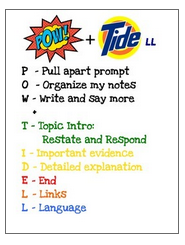Yet, while we know writing in math is important, how often do we employ math writing activities with depth?
In thinking more about this, I will begin the new year with the following writing prompt and activity:
Prompt: Study the math operations in the graphic below, and write an essay that compares and contrasts the four operations.
 |
| SRSD Guiding Poster |
We'll use Leslie Laud's SRSD work to guide our collective writing work.
First, we'll employ POW:
- We'll study the prompt and highlight main parts of the question.
- We'll list important math language that connects to this prompt.
- We'll organize the information using a T-chart.
- Students will write, and say more following the TIDE mnemonic. Students will "write" with partners using Google docs.
TIDE, as shown on the mini poster to the right, gives structure to the essay. I'll also review with students the importance of using links to connect their ideas and good math language to express those ideas.
Once students complete their first draft, they'll edit their work with another partner group. Next students will have the chance to add great titles and graphics to the post. Finally, we'll share the writing via poster, video clips, and/or online with the learning community. As enrichment, I'll suggest that students code an animation that matches their essay using SCRATCH or another coding language.
This writing activity will help students to think deeply and accurately about which operations to employ as they solve math problems and evaluate numerical expressions.
Addition
As I approach this lesson today, I cringe a bit because writing an essay about math is a dry experience, not one that students will be jumping out of their seats to do. So I'll add the carrot that once students express the big ideas on paper in an essay format, then they can use that information to draft a poem, song, rap, story, illustrations, code or more. I'll tell them that it's important to analyze, think deeply, and get the main points down first so that once you get to the "fun, creative part" you'll be sure to create something that has depth and purpose as well. Let's see how that works.
Addition
As I approach this lesson today, I cringe a bit because writing an essay about math is a dry experience, not one that students will be jumping out of their seats to do. So I'll add the carrot that once students express the big ideas on paper in an essay format, then they can use that information to draft a poem, song, rap, story, illustrations, code or more. I'll tell them that it's important to analyze, think deeply, and get the main points down first so that once you get to the "fun, creative part" you'll be sure to create something that has depth and purpose as well. Let's see how that works.
